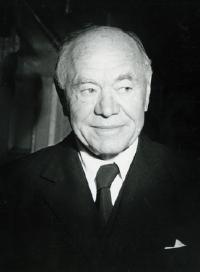Sir William Maxwell Aitken

Photo: UNB.ca
Sir William Maxwell Aitken (1st Baron Lord Beaverbrook). Born 1879 in Maple, Ontario; died 1964 in Surrey. Son of William Aitken, a Scottish Presbyterian minister, and Jane Aitken.
The Aitken family moved from Ontario to Newcastle, New Brunswick, in 1880. Max attended school but did not attend a post-secondary institution. He started his own newspaper publication, The Reader, at the age of thirteen and was also a correspondent for the Saint John Sun as an adolescent. These achievements foreshadowed his career as a newspaper mogul in England, where he acquired several successful publications and founded The Sunday Express newspaper. Max lived in Newcastle until his early twenties and then lived variously in Calgary, Montreal, and England (1911).
The books Aitken published are as follows: Canada in Flanders (1916); Politicians and the Press (1925); Politicians and the War, 1914-1916 Vol. 1 (1928); Politicians and the War, 1914-1916 Vol. 2 (1932); Men and Power (1956); Friends: Sixty Years of Intimate Personal Relations with Richard Bedford Bennett (1959); Courage: The Story of James Dunn (1961); The Decline and Fall of Lloyd George (1962); The Divine Propagandist (1962); My Early Life (1962); Success (1962); and The Abdication of King Edward VIII (1966).
Aitken’s works focussed on the political situations he was involved in and the personalities whom he encountered during his years as a politician and press baron. Aitken was mentored by men who would become his lifelong patrons and role models. Richard Bedford Bennett (former prime minister of Canada) was his first role model. Aitken’s first experience in politics was helping out with Bennett’s campaign to become alderman in Chatham, NB. John F. Stairs, president of Union Bank, was Aitken’s financial patron; Stairs set him up with his own finance company, Royal Securities Corporation, which made Aitken his first fortune. Andrew Bonar Law (Britain’s only Canadian-born prime minister) was another influence on Aitken. His friendship and social connection to Law oriented him toward British politics very quickly, and his career in politics and finance was aided greatly by Law. Aitken was also a friend and consultant to Winston Churchill in the Second World War. This role led to his positions as minister of aircraft production and, later, the minister of supply. These powerful men become vivid personalities in Aitken’s books.
Despite living in England, Aitken was a spokesperson for Canada during the First and Second World Wars. During the First World War, he was an honorary colonel and was instrumental in reporting Canada’s contributions to the war effort. Aitken’s first book, Canada in Flanders (1916), was a three-volume record of these contributions.
Max Aitken was also especially important in New Brunswick, where he became a major patron and benefactor. He contributed significantly to the University of New Brunswick in Fredericton by creating various scholarships and by giving financial support to the Lady Beaverbrook residence, the Lady Beaverbrook gymnasium, and the library. He became the chancellor of the university in 1947, which ensured his connection to New Brunswick. He was not simply a figurehead, but participated actively in university affairs, travelling to Fredericton frequently on university business. In New Brunswick he was also a builder: he built the Beaverbrook Art Gallery in 1959 and headed various civic and cultural projects in Newcastle and Fredericton.
His books received a mixture of reviews but were quite well received overall. Biographer A.J.P. Taylor commented negatively that he wrote “sordid stories of intrigue and personal ambition.” In other words, some critics complained that he wrote in ways that were self-serving. Other critics enjoyed his books for their history and their insider’s view of the workings of some of the twentieth-century’s most significant events and people.
In 1911 Aitken was knighted Sir Max by King George V. In 1917 he was given peerage as 1st Baron Lord Beaverbrook, a title reminiscent of the Miramichi region (specifically, Beaverbrook Stream) where he grew up.
Jennifer Amos, Winter 2008
St. Thomas University
Bibliography of Primary Sources
Beaverbrook, Maxwell Aitken. The Abdication of King Edward VIII. London: Hamish Hamilton Ltd., 1966.
---. Canada in Flanders. Vol. 1. London: Hodder and Stoughton, 1916.
---. Canada in Flanders. Vol. 2. London: Hodder and Stoughton, 1917.
---. Courage: The Story of Sir James Dunn. Fredericton, NB: Brunswick Press, 1961.
---. Don't Trust to Luck. London: London Express Newspaper, 1954.
---. The Decline and Fall of Lloyd George. New York: Duell, Sloan and Pearce, 1963.
---. The Divine Propagandist. London: Heinemann, 1962.
---. Friends: Sixty Years of Intimate Personal Relations with Richard Bedford Bennett. London: Heinemann, 1959.
---. Men and Power. New York: Duell, Sloan and Pearce, 1956.
---. My Early Life. Fredericton, NB: Brunswick Press, 1965.
---. Politicians and the Press. London: Hutchinson and Co., 1925.
---. Politicians and the War. Vol. I. London: Thornton and Butterworth Ltd., 1928.
---. Politicians and the War. Vol. II. London: The Lane Publications, 1928.
---. Resources of the British Empire. London: The Lane Publications, 1934.
---. Success. London: Stanley Paul and Co., 1921.
---. The Three Keys to Success. New York: Duell, Sloan and Pearce, 1954.
Bibliography of Secondary Sources
Chisholm, Anne, and Michael Davie. Beaverbrook: A Life. London: Hutchinson Publishing, 1988.
Cockett, Richard. My Dear Max: The Letters of Brendan Bracken to Lord Beaverbrook,1925-1958. London: The Historians’ Press, 1990.
Driberg, Tom. Beaverbrook: A Study in Power and Frustration. London: Weidenfeld and Nicolson, 1956.
Farrer, David. G-- For God Almighty: A Personal Memoir of Lord Beaverbrook. New York: Stein and Day Publishers, 1969.
Gourlay, Logan. The Beaverbrook I Knew. London: Quartet Books Ltd., 1984.
Howard, Peter. Beaverbrook: A Study of Max The Unknown. Fredericton, NB: Brunswick Press, 1964.
Richards, David Adams. Lord Beaverbrook. Toronto: Penguin Books, 2007.
Taylor, A.J.P. Beaverbrook. London: Hamish Hamilton Ltd., 1972.


